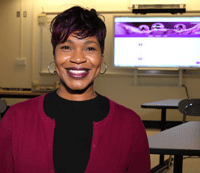Allan Anderson (right) is a professor of computer science and the chair of the technologies department at Three Rivers Community College in Norwich. For 13 years he has taught students seeking associates and advanced degrees — as well as career readiness skills — in a wide variety of fields. Anderson previously worked in the private sector, including several years in technology support and training, where he gained considerable experience in classroom-based and online instruction.
Since obtaining his masters degree in computer science 46 years ago, Anderson has seen a great deal of change in the field — including how it’s now viewed in academia.
“Everyone should be able to code,” said Anderson, a member of our affiliated Federation of Technical College Teachers. “Today, 70% of STEM (science, technology, engineering, and math) jobs are computing-related. So if you get a degree in mechanical or electrical engineering, odds are that you’ll need to be able to program,” he added.
Anderson believes that computer science is not just integral to technology-related fields of study, but that it has also become essential to other associate, bachelors and masters programs. In his view, the increased focus on teaching K-12 and community college students to code signals a growing recognition of its value.
“A student who majored in early childhood development may not be writing artificial intelligence algorithms on the job,” said Anderson. “But as they pursue their career and grow in their field, they will need these various technologies to help teach children the skills they need to learn,” he added.
Click here for recent press coverage connecting computer science education to the jobs of the future.
 Patricia Mann (right) heads the information systems technology department at A.I. Prince Technical High School in Hartford where she has taught students for 16 years. Prior to choosing her current vocation, Mann worked in the private sector as a programmer for an insurance company. She sees parallels between her state service and her corporate experience that demonstrate the rapid pace at which the demand for computer education is growing.
Patricia Mann (right) heads the information systems technology department at A.I. Prince Technical High School in Hartford where she has taught students for 16 years. Prior to choosing her current vocation, Mann worked in the private sector as a programmer for an insurance company. She sees parallels between her state service and her corporate experience that demonstrate the rapid pace at which the demand for computer education is growing.Click here to watch Mann share how she expresses to her students that “there are computers in everything” they need to learn.
“We used to say that as soon as you purchase new software, it’s immediately outdated,” said Mann, a member of our AFT Connecticut-affiliated State Vocational Federation of Teachers. “That’s how quickly the computer ‘revolution’ is constantly moving. Now that I’m in the public sector, I now see how a lack of adequate funding results in us becoming stagnant and unable to keep up,” she added.
Mann’s message to Connecticut policymakers is that they should make computer science education a real priority in our state’s and K-12 schools and community colleges.
“Bigger, better, greater, faster; that’s what computer technology is all about,” said Mann. “Investments in computer science education are vital for us as instructors to be able to meet our students’ needs. Without it, our program dies,” she added.
Mann’s concerns are particularly resonant as the State Board of Education (SBOE) recently proposed massive cuts to Connecticut’s technical high schools in response to ongoing budget shortfalls. Among officials’ recommendations at their October meeting were to shutter at least two of the system’s 17 schools and slash millions in funds that support career and technical education services.
Click here for press coverage of reaction to the SBOE’s proposals.
The theme of this year’s international recognition week, “Computer Science for All,” recognizes the need to expand computer code learning opportunities for K-12 and community college students. It follows on a White House initiative launched earlier this year when President Barack Obama urged Congress to appropriate funding to support computer science programs across the country.
Click here for press coverage of the launch of the president’s program.
CSEdWeek is an international campaign designed to inspire interest in the study of computer science that last year was supported by 350 partners and 100,000 educators worldwide. The effort is organized annually by the non-profit organization, Code.org, which is dedicated to expanding access to computer science, and increasing participation by women and underrepresented minorities.
Click here to learn more about 2016 CSEdWeek.

